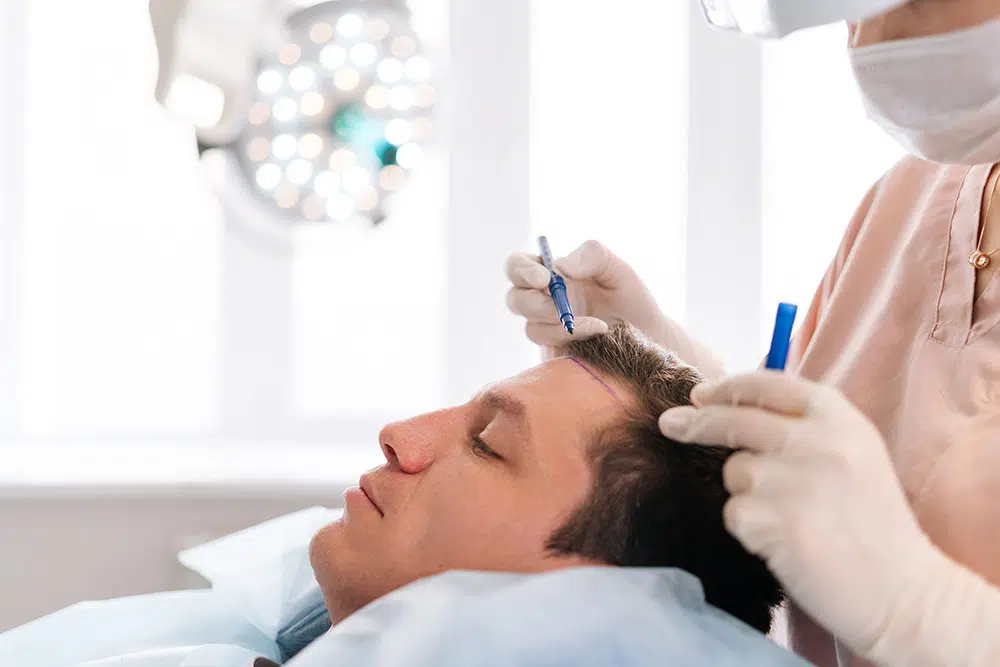Why Is My Hair Falling Out? Common Causes and Solutions
Last updated on August 19, 2025
Noticing more hair in your brush than usual? Hair shedding is a normal part of life—we lose around 50 to 100 hairs a day. But when that number starts creeping up and you find your hair thinning or bald patches forming, it’s natural to feel a little concerned. So, what’s going on? Let’s break down the most common causes of hair loss—and what you can do about them.
1. Genetics (Androgenetic Alopecia)
If you have a parent or grandparent with thinning hair or a receding hairline, you might have inherited more than just their eye color. Genetic hair loss, also known as androgenetic alopecia, is the most common form of hair loss in both men and women.
In men, it often appears as a receding hairline or balding at the crown. In women, it usually causes a general thinning across the scalp, particularly at the part line.
What helps:
This type of hair loss is progressive, but it can be slowed down or even reversed with early intervention. Hair transplant surgery, medication, and treatments like Growth Factor Therapy (which uses your body’s own natural proteins to stimulate growth) are often effective options.
2. Hormonal Changes
Hormones play a massive role in regulating your hair cycle, for both men and women. Concerning women, that is why life stages like pregnancy, childbirth, menopause, or stopping birth control can cause noticeable shedding. Conditions like PCOS (Polycystic Ovary Syndrome) or thyroid imbalances can also trigger hair loss. Concerning men, both high and low testosterone commonly results in hair loss.
What helps:
If your hair loss is related to hormones, addressing the underlying hormonal imbalance is key. Ask Dr. Arthur Zacco about blood tests to check your thyroid and other hormone levels such as testosterone, estrogens, estrones, DHT, etc. Once things are under control, your hair often starts growing back.
3. Stress and Trauma
Been through a major life event or dealing with chronic stress? Your hair feels it too. Stress-induced hair loss, or telogen effluvium, happens when stress shocks your system and pushes more hair into the resting (shedding) phase of the hair cycle.
It doesn’t show up immediately—often two or three months after the triggering event.
What helps:
The good news is this kind of hair loss is usually temporary. Managing stress through exercise, meditation, better sleep, and lifestyle changes can make a big difference. Nutritional support and scalp treatments may also help speed up regrowth. Dr Arthur Zacco specializes in evaluating and treating over 30 nutritional deficiencies.
4. Poor Nutrition
Your hair is one of the first places to suffer when your body isn’t getting what it needs. Deficiencies in iron, iodine, vitamin D, biotin, protein, zinc, etc, can all lead to increased shedding or weak, brittle hair.
Crash diets, restrictive eating patterns, or underlying digestive issues can also affect how well your body absorbs nutrients.
What helps:
Dr. Arthur Zacco is a certified anti-aging specialist who can conduct a comprehensive hormonal and nutritional evaluation. AZ Hair Restoration can provide IV nutritional supplementation and hormonal replacement therapy (HRT). Get a full blood panel done to identify any hormonal or nutritional deficiencies. In many cases, a balanced diet filled with foods that support hair growth alongside targeted supplements can help restore healthy hair.
5. Medical Conditions and Medications
Certain health conditions—like autoimmune disorders (such as alopecia areata), scalp infections, or chronic illnesses—can lead to hair loss. Likewise, some medications for high blood pressure, depression, cancer, or high cholesterol can list hair loss as a side effect.
What helps:
It’s important to speak to your doctor if you suspect your medication may be contributing to hair loss. Never stop taking medication without medical supervision. In many cases, switching medications or combining treatments with hair restoration therapies can help reduce the impact.
6. Tight Hairstyles and Styling Damage
Constantly wearing your hair in tight or heavy dreadlocks, ponytails, braids, weaves, or buns can cause traction alopecia, where repeated tension damages the hair follicle permanently. Likewise, excessive heat styling, bleaching, or chemical treatments can weaken hair strands and cause breakage.
What helps:
Be kind to your hair. Loosen up your hairstyles, take regular breaks from heat tools, and use nourishing, restorative hair care products. If the hair follicles haven’t been permanently damaged, hair usually regrows once the stress is removed.
7. Age
As we get older, hair naturally becomes finer and thinner. For women, this is especially common around menopause due to declining estrogen levels. Men may continue losing hair if they’re genetically prone to it.
What helps:
While age-related thinning is natural, there are still options to improve hair density. Hair restoration treatments, including FUT and FUE hair transplants, growth factor therapy, and medical treatments, can help you maintain fuller, healthier-looking hair for longer.

Early Treatment is the Best Treatment!
Hair loss isn’t just about what’s happening on the outside—it’s often your body’s way of telling you something’s off on the inside. Whether it’s stress, hormones, genetics, or health-related, the key is identifying the cause and taking action early.
If you are worried about your hair falling out, your best resource is a hair restoration expert. A medical doctor specializing in hair loss and restoration treatments can diagnose your condition and provide some options to restore the more youthful and healthy appearance of a fuller head of hair. In Raleigh, North Carolina, Dr. Arthur Zacco is a hair restoration expert providing a range of treatment methods, including:
- Follicular unit extraction (FUE)
- Multiple follicular unit (MFU)
- Strip hair transplant (FUT)
- Exosomes injections
- Hair transplantation
- Growth Factor Therapy
To learn the cause of your hair falling out and to discuss possible treatment methods, schedule your FREE in-person or virtual consultation with Dr Arthur Zacco, founder of AZ Hair Restoration in 1996. Call us today at 919-615-0577.
FAQs
Is it normal to lose hair every day?
Yes—on average, most people lose between 50 to 100 hairs a day as part of the natural growth cycle. But if you notice excessive shedding, thinning, or visible patches, it’s time to investigate it further – the sooner the better. A professional, free hair loss evaluation at AZ Hair Restoration can help determine if your hair loss is normal or a sign of something more.
What’s the difference between hair shedding and hair loss?
Hair shedding is temporary and part of the normal cycle—like after stress, illness, or hormone fluctuations after childbirth. Hair loss, however, involves slowed regrowth or permanent thinning due to genetics, hormones, or medical conditions. If you’re unsure which applies to you, our hair loss clinic in North Carolina offers free scalp and hair evaluations to help you understand what’s really happening.
What’s the best age or time to start treating hair loss?
The sooner, the better. Early intervention helps to preserve existing hair and opens the door to more effective hair restoration options. For example, early stage thinning can benefit from exosome therapy or growth factor treatment, which can even reverse this hair loss – while later stage hair loss may require a hair transplant. Whether you’re in your 20s or 70s, AZ Hair Restoration provides customized plans based on your current hair health, goals, and stage of hair loss.
Is hair loss treatable without surgery?
Yes—many forms of hair loss can be treated with non-surgical options such as Growth Factors, lifestyle adjustments, or medical exosome treatments. These solutions can strengthen follicles, stimulate regrowth, and improve hair density. At our hair restoration clinic in Raleigh, NC, we’ll assess your hair and scalp to develop a treatment plan that fits your goals, whether that’s a surgical option or a minimally invasive approach with no downtime. Visit AZ Hair Restoration for a complete evaluation of your hair loss.
How do I know if my hair loss is permanent or temporary?
Temporary hair loss often results from stress, hormonal shifts, or nutritional deficiencies, while permanent hair loss is typically due to genetics or scarring conditions. The only way to know for sure is through a medical diagnosis. At AZ Hair Restoration in Raleigh, NC, Dr. Arthur Zacco can perform a thorough scalp and medical evaluation to determine the cause and recommend the right course of treatment for lasting results.









